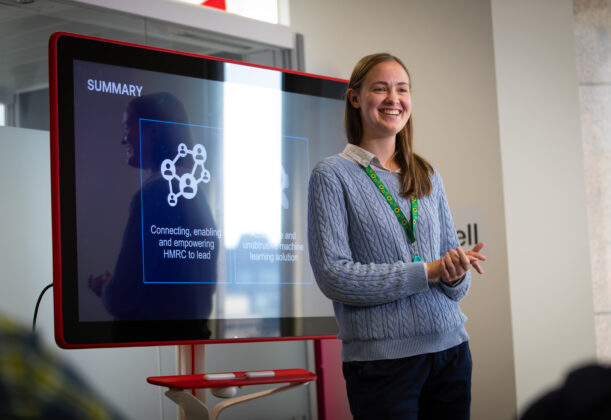International Women’s Day 2024 – Inspire Inclusion
International Women’s Day is a global day celebrating the social, economic, cultural, and political achievements of women. For this International Women’s Day 2024 the theme is to Inspire Inclusion.
We heard from Vera Pudilova, (Communications and Engagement Adviser at the Environment Monitoring and Planning Programme) to hear more about her journey and how we can all create more inclusive environments for all.

Tell us a little more about yourself?
I work in the Environment Agency as a Comms and Engagement Adviser for the Environment Monitoring and Planning programme (EA), where we are transforming monitoring and planning data and IT to enable environmental improvements. I am also a co-lead for the Department for Environment Food & Rural Affairs (DEFRA) Autism and ADHD network.
Previously, I was in the EA’s Agriculture Programme where I created a model to predict which farms are causing pollution to agriculture, a finalist in the Civil Service Data Challenge, and I have a background in climate advocacy.
In my free time I enjoy playing ultimate frisbee, walking my dog, and doing illustrations for my Happy Autistic Lady page.
What barriers have you faced in your career?
I, like roughly 70,000 other women in the UK, am Autistic. It is thought that about 3% of the world’s population are Autistic, but currently in the UK, only 0.2% of women have a diagnosis.
Autism is a neurocognitive difference affecting the way that a person thinks, perceives, and interacts with and experiences the world around them. Autistic people may have strong interests, self-soothe with repetitive behaviours, and struggle with sensory sensitivity, social interaction and communication, and their mental health.
When I first googled autism at the age of 10, I was told that women cannot be Autistic. Thankfully, I researched it again a decade later and found the answer to why I had always felt so different, why I struggled with some things, and why I experienced the world around me so intensely.
I was nervous about entering the workforce, because only 16% of Autistic people are in full-time employment. Even though we have the Equality Act 2010, public perception of autism is still quite negative, and workplace adjustments take more effort to implement than they should.
How did you overcome this?
- Leaning into my strengths
When it comes to inclusion, too often we focus on mitigating the challenges someone has. Don’t get me wrong – workplace adjustments are essential… but why not empower someone’s strengths, too? I chose to go into data and digital because I wanted to use my creative problem-solving skills, and have moved over to comms as, even though Autistic people are thought to struggle with communication, I have an advantage: because I had to learn these skills from scratch and look at the world from a different angle, I can make really clear, visual, accessible products (and I love a good plan). - Seeking community
I became a co-lead of the Defra-wide Autism and ADHD network because I wanted to help people like me feel less afraid. We have resources on everything from workplace adjustments to self-advocacy, run virtual talks and drop-in sessions, have a nation-wide list of local resources and even host in-person events. The network has grown to 1000 members and a huge team of dedicated volunteers. Whenever I am feeling low, I remember that I am a part of something bigger, and that, together, we are making a change not just in our government departments, but society as a whole. - Ask for help
I am incredibly lucky in the teams I have been in. Fighting for inclusion, acceptance, and safety is not a one-woman job. Asking for help can be really, really hard, but whenever I did, I was able to realise I am not alone. Whatever the problem was, other people have experienced it too, and are happy to help. Special shoutout to my line manager Matt Starr, who always stands up for what he believes in, even if it takes a lot of time and effort, and to my programme director Jenny Connelly, for being so passionate, taking everyone on the journey with her, and helping us be the best we can be.
What does inclusion and diversity mean to you? What steps do you take to inspire inclusion?
For me, diversity means resilience. The more different experiences, cultures, backgrounds, and ways of thinking we incorporate, the stronger we are and the better outcomes we get for everyone.
Inclusion is not leaving anyone behind – but I would go one better and say we should be aiming for belonging, which takes inclusion as a matter of course and so everyone is thinking about other perspectives, always asking what support people need, and treating everyone as equals and with respect.
How can we all inspire inclusion in our environments?
Ask – everyone has different preferences, different support needs at different times, and different struggles. Is the way things are currently done good enough?
Listen – without judgement. You never know what you might learn, and often just feeling heard makes a big difference!
Act – wherever and whenever you can. No matter how small: a little change goes a long way
